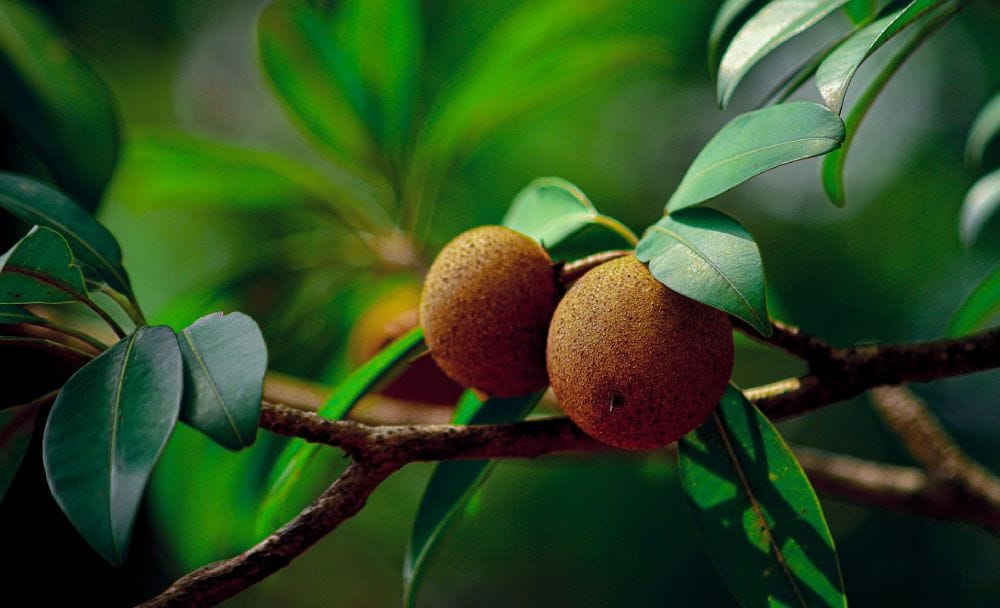
Nature has blessed us with an abundance of fruits that provide us with innumerable benefits. But one such juicy fruit that packs a punch with various nutrients is Chiku.
Chiku or sapodilla, scientifically known as Manilkara zapota, is one of the tropical plants belonging to the Sapotaceae family.
The Chiku plant contains several phytochemical constituents like saponin, myricetin-3-O-𝛼-L-rhamnoside, ascorbic acid, β-carotene, which have medicinal benefits. Further, various parts of the plant are used as home remedies to cure health problems.
In this blog, we will explore 15 amazing Chiku benefits.
15 Incredible Health Benefits of Chiku
1. Antibacterial activity
Primary benefit: The root extract of Chiku has potent antimicrobial activity against both Staphylococcus aureus and E.coli.
Secondary benefit: The bark extract of Chiku possesses bacteriostatic activity against Basicillus subtilis, Bacillus megaterium, Bacillus cereus, Salmonella typhii, Shigella shiga, etc.
The antibacterial activity of Chiku is due to the presence of tannins, glycosides, alkaloids, saponins, and carboxylic acids in the plant.
2. Antifungal activity
Overall benefit: The stem bark extract of Chiku shows antifungal activity against Aspergillus flavus, Fusarium and Vasianfactum.
The antifungal activity of Chiku may be due to the presence of terpenoids, flavonoids, and glycosides.
3. Anti-inflammatory activity
Primary benefit: The high content of tannins makes Chiku an important anti-inflammatory agent. This helps improve the overall health of the digestive tract by preventing diseases like esophagitis, enteritis, irritable bowel syndrome, and gastritis.
Secondary benefit: Inflammation is associated with histamine release. Anti-inflammatory activity is possessed in the leaves of the Chiku plant. Chiku leaves may help reduce inflammation due to their inhibitory action on the release of histamine.
4. Analgesic activity
The presence of alkaloids, polyphenols, and flavonoids in the Chiku plant contributes to its analgesic activity.
Overall benefit: The mechanism of the analgesic action of the Chiku plant is based on the desensitization of nociceptors and non-selective inhibition of the cyclooxygenase pathway.
5. Immunity Booster

Overall benefit: Chiku is enriched with Vitamin C, Vitamin A, and antioxidants that play a pivotal role in boosting the immune system, scavenging free radicals, and reducing the risk of various health issues.
6. Energy Booster
Primary benefit: Chiku is said to be an instant source of energy due to the rich content of fructose and sucrose. Therefore, Chiku nutrition is considered the most ideal during a workout session.
Secondary benefit: Further, it is usually advised for growing children and pregnant women for a quick source of nutrients and general well-being.
7. Promotes Skin Health
Primary benefit: Chiku is a great fruit for enhancing skin health and beauty. Enriched with vitamins A, C, E, and K, Chiku benefits include keeping the skin hydrated and rejuvenating the skin cells. The polyphenols, flavonoids, and antioxidants help prevent skin wrinkles and improve skin complexion.
Secondary benefit: The milky secretion obtained from sapota is beneficial in clearing warts and fungal infections in the skin.
8. Antidiarrheal activity
Overall benefit: Chiku leaf extract showed antidiarrheal activity in an experimental study done on castor oil and magnesium sulphate-induced albino mice. The antidiarrheal activity of Chiku leaves may be due to the increase in re-absorption of electrolytes and water from the GIT or inhibition of prostaglandin biosynthesis. The antidiarrheal properties of Chiku is attributed to the presence of flavonoids and saponins.
9. Gastrointestinal health
Primary benefit: From an Ayurvedic perspective, Chiku fruit benefits include balancing the increased Pitta Dosha, thus keeping the gut healthy and preventing it inflammation. The rich fiber content in the chiku aids in digestion and works as a laxative, thus providing relief from constipation.
Secondary benefit: The presence of tannins in Chiku have polyphenols content which neutralize acid secretion in the gut. The antiviral and anti-inflammatory properties help soothe irritated gastrointestinal tract and are useful in gastritis, and other bowel issues.
10. Bone Health
Primary benefit: The presence of minerals such as calcium, phosphorus, copper, and iron in Chiku helps strengthen the bones. Regular intake of the Chiku fruit can therefore help improve bone quality.
Secondary benefit: If there is a lack of copper in your diet, it may increase the risk of osteoporosis. Chiku, with the presence of copper, promotes muscle and tissue strength and helps prevent osteoporosis.
11. Hepatoprotective effect
Overall benefit: Studies suggest that Chiku contains certain hepatoprotective activities. This property is based on the strong antioxidant activity due to the presence of flavonoids, carotenoids, and ascorbic acid.
12. Regulates blood pressure

Overall benefit: Enriched with a good amount of potassium, Chiku helps in lowering sodium levels, promotes blood circulation and regulates blood pressure.
13. Reduces side effects of aging
Primary benefit: Regular intake of Chiku fruit helps reduce the signs of aging both visually and internally with the help of Vitamin A and other antioxidants that scavenge harmful free radicals.
Secondary benefit: High iron content helps stop the depletion of the hemoglobin content of the blood. Further, the elastase inhibitory activity of Chiku works as an anti-aging agent.
14. Hypoglycemic activity
Overall benefit: Studies show the hypoglycemic activity of Chiku is attributed to the aqueous and ethanolic extracts of the seeds. The presence of phytochemical constituents like saponins, sapotin, achrassaponin and the bitter principle sapotinine in the Chiku seeds have an anti-diabetic effect.
15. May reduce risk of cancer
Overall benefit: Since the Chiku fruit is rich in antioxidants, it may help reduce the risk of various cancers. Vitamins A & B help maintain the mucus lining of the lungs therefore lowering the risk of lung and oral cancers. Further, the dietary fibre in Chiku is said to keep the gut healthy thus preventing the onset of colon cancer.
FAQ’s
1. Does Chiku help in gut health?
From an Ayurvedic perspective, Chiku fruit benefits include balancing the increased Pitta Dosha, thus keeping the gut healthy and preventing it from inflammation. The rich fibre content in the chiku aids in digestion and works as a laxative, thus providing relief from constipation.
2. Does Chiku help contribute to skin health?
Chiku is a great fruit for enhancing skin health and beauty. Enriched with vitamins A, C, E, and K, Chiku benefits include keeping the skin hydrated and rejuvenating the skin cells. The polyphenols, flavonoids, and antioxidants help prevent skin wrinkles and improve skin complexion.
3. Is Chiku anti-aging in nature?
Regular intake of Chiku fruit helps reduce the signs of aging both visually and internally with the help of Vitamin A and other antioxidants that scavenge harmful free radicals.
4. Does Chiku help regulate blood pressure?
Yes, Chiku does help in regulating blood pressure. Enriched with a good amount of potassium, Chiku helps in lowering sodium levels, promotes blood circulation, and regulates blood pressure.
Conclusion
Chiku is a sweet, juicy, healthy fruit that can be added to your regular diet for a hearty, healthy life. From boosting energy, and immunity to ensuring gut health, Chiku fruit benefits can be leveraged for overall health and well-being most deliciously.
Disclaimer: The information mentioned here is for educational purposes only and is not intended to be an alternative to medical treatment by a medical practitioner. Please consult a professional medical practitioner before any dietary modifications.
References:
- Chikoo: A wonderful gift from nature
- CHIKOO/SAPODILLA


















